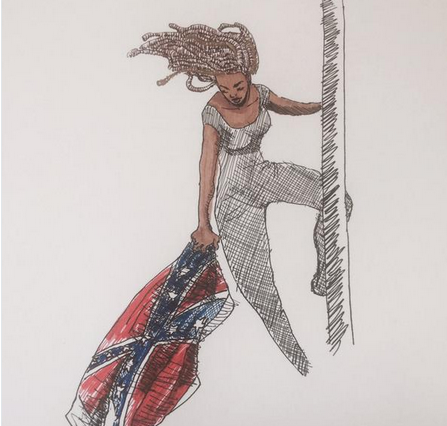Opinion
Anti-Confederate Flag Activist Bree Newsome on the Relationship of Art to Activism


Ben Davis

In the early hours of Saturday, Bree Newsome scaled the flagpole in South Carolina’s capital to take down the Confederate battle flag, inspiring people across the country (see my own Why the Confederate Flag Should Not Be Placed in a Museum). Photos of Newsome in action became almost immediately iconic, with many artists taking to the web to depict her as a real-life superhero.
As it turns out, Newsome has some art of her own to share with the world. Her personal website describes her as a “Writer / Director / Producer / Singer / Songwriter / Activist / Consultant / Speaker”—an octuple threat. Getting newfound attention in the wake of her action is her film work, specifically Wake, a 2010 Southern Gothic horror film set in Newsome’s native North Carolina.
The atmospheric 21-minute short, depicting a woman who makes a deal with the devil in order to create the perfect man, can be watched in its entirely on YouTube. It is well worth doing so:
How does this type of work fit in with Newsome’s activism? Speaking on a panel last year at Spelman College on “Afrofuturism,” she offered a theory about the importance of science fiction, fantasy, and horror for African-American artists:
It’s hard to be an artist and not be an activist. Not if you are going to tell any kind of truth about what you see in the world. Whether it’s art that I’m making or whether it’s political activism, fighting for voting rights, it’s all essentially the same thing. It’s about fighting for that space, expanding outward, fighting against this extremely limited space that we are confined to.
I think the power of specifically science fiction/horror, and why that is a genre that we continue to break new ground in, is because it is essentially about the present. Horror and science fiction are all about examining the present and then questioning it, and pushing beyond that. So much of limiting the space we have access to is about getting us to stop thinking beyond that current moment.
The clip of the Spelman panel is here: